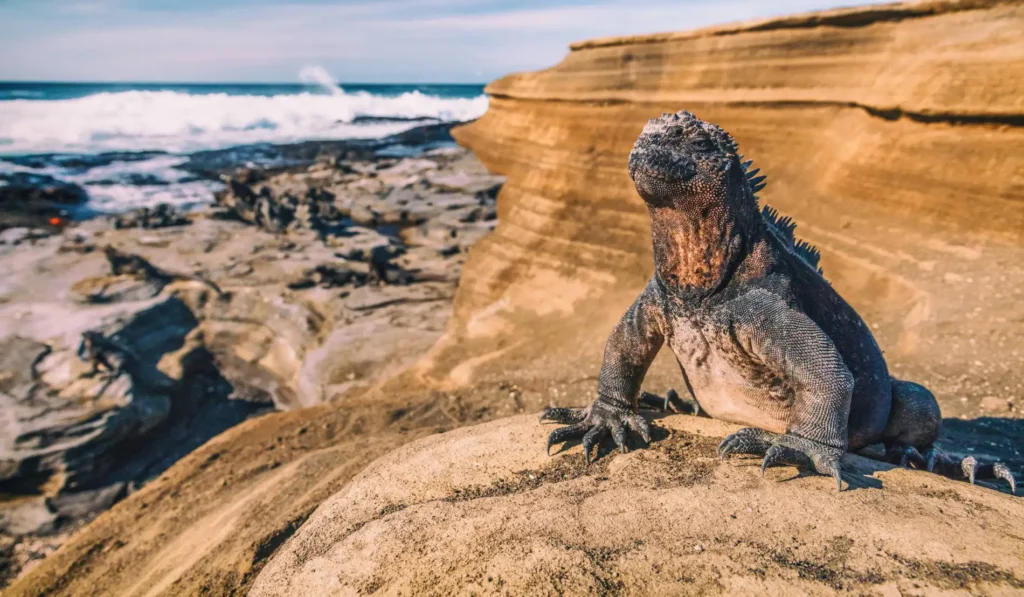The Galápagos Islands are a volcanic archipelago located in the Pacific Ocean, about 1,000 kilometers off the coast of Ecuador, the country to which they belong. Comprising 18 main islands and numerous smaller islets, the archipelago is renowned for its remarkable biodiversity and as one of the most iconic destinations for scientific studies in biology and ecology.
What makes the Galápagos Islands truly unique is their geological history and isolation. The islands were formed by volcanic eruptions millions of years ago and, due to their distance from the mainland and relative inaccessibility, developed an extraordinary variety of endemic species. It was in this environment that British naturalist Charles Darwin formulated his theory of evolution by natural selection after visiting the islands in 1835.

The wildlife of the Galápagos Islands is remarkable. From sea lions to giant tortoises, marine iguanas, and a variety of seabirds, the islands host a wealth of species found nowhere else on Earth. These creatures have evolved in isolated environments, resulting in unique adaptations and fascinating behaviors.
In addition to their scientific importance, the Galápagos are a popular tourist destination, drawing visitors from around the globe who wish to explore their natural beauty and dive into their crystal-clear waters. However, the rise in tourism has posed conservation challenges, prompting Ecuadorian authorities to implement measures to protect the islands’ fragile ecosystems.
Today, the Galápagos Islands remain a living laboratory for scientific research and a symbol of the importance of biodiversity conservation. Their status as a UNESCO World Heritage Site and the ongoing efforts of conservation organizations ensure that this unique natural treasure is preserved for future generations.
However, the Galápagos Islands are now facing the challenge of tourist overcrowding. In response, Ecuador’s Ministry of Tourism has announced a significant adjustment to entry fees, set to take effect on August 1, 2024.
Visitors will now face a substantial increase, with entry fees doubling to up to $200. However, a discount policy has been established for citizens of Mercosur countries such as Argentina, Brazil, and Peru. These visitors will pay a reduced fee of $100 per person. Despite the increase, it is important to note that children under two years of age will have free entry, regardless of nationality.
This marks the first increase in Galápagos entry fees since 1998 and is a crucial measure to alleviate pressure on this ecologically sensitive destination. With these new fees, authorities aim to manage visitation more sustainably, ensuring the preservation of these unique islands for future generations.
“The Galápagos Islands are not only a national treasure but also a global one. It is our collective responsibility to protect and preserve this incomparable ecosystem for future generations,” stated Niels Olsen, Ecuador’s Minister of Tourism, in a statement shared with the Galapagos Conservation Trust.
Olsen emphasized that the additional revenue from ticket sales will be directed toward conservation initiatives on the islands, situated 1,000 kilometers from mainland Ecuador.
The Galápagos, a UNESCO World Heritage Site comprising over 100 islands, are known as a “living museum,” home to a rich diversity of plants and animals, many of which are rare or threatened with extinction.
Despite only about 30,000 people residing in the Galápagos Islands, approximately 170,000 tourists visit annually, highlighting the importance of management measures to balance environmental preservation with sustainable tourism.
The Galapagos Conservation Trust (GCT) is a UK-registered charity dedicated to promoting conservation and sustainability in the Galápagos Islands. Established in 1995, the GCT works closely with local partners, government authorities, scientists, and communities to protect the islands’ fragile ecosystem and unique species.
The GCT’s mission is to support conservation, research, and education projects in the Galápagos, aiming to ensure that the islands continue to be an example of biodiversity and a living laboratory for scientific studies. The organization works on multiple fronts, from funding conservation and research projects to engaging local communities and supporting environmental education.
The GCT focuses on protecting the Galápagos’ endemic wildlife, preserving natural habitats, mitigating environmental threats such as invasive species and pollution, and fostering sustainable tourism practices. The organization also plays a vital role in raising public awareness about the importance of the Galápagos and mobilizing support for its causes.
The GCT operates through donations, project funding, partnerships, and volunteer programs, tirelessly working to ensure that the Galápagos Islands continue to thrive as one of the world’s most remarkable and iconic ecosystems. Their work is crucial to protecting this natural heritage for present and future generations.
“In recent years, we have witnessed a worrying increase in the number of visitors to the islands, driven by a sharp rise in land-based tourism,” the organization stated on its website.
“This is pushing waste management systems to the limit, exacerbating water and food insecurity, and heightening the threat of devastating invasive species being introduced to the islands,” it added.
These warnings underscore the critical importance of sustainable tourism approaches and conservation measures to safeguard the precious biodiversity and fragile ecosystems of the Galápagos Islands.
Despite the challenges faced, the Galápagos Islands remain a site of significant scientific discovery. Last year, researchers found a previously unknown coral reef believed to be thousands of years old.
In 2021, UNESCO released a report addressing the state of conservation activities in the region. The report praised the Ecuadorian government’s efforts in reducing illegal fishing and controlling the spread of invasive species but called for an update by 2024.
Global visibility of the destination may increase this year with the release of a new film directed by Ron Howard. The film, titled Eden, explores a true story of scandal, sexual liberation, and murder that occurred on one of the Galápagos Islands in the 1930s. Starring Sydney Sweeney, Vanessa Kirby, Ana de Armas, and Jude Law, Eden promises to deliver a fascinating narrative set against this unique backdrop.

